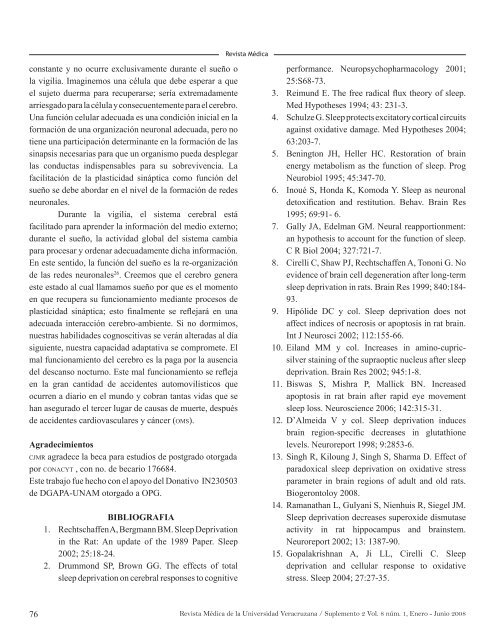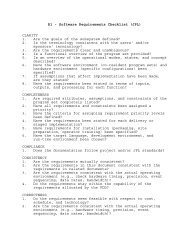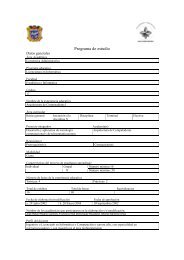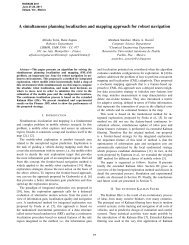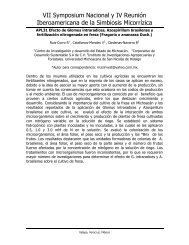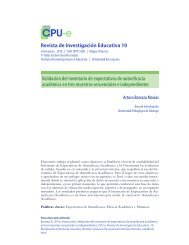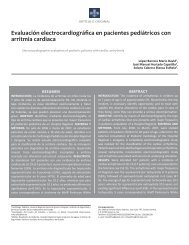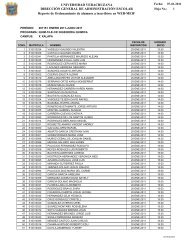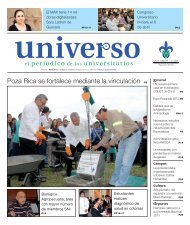Suplemento 2 Vol 8 No 1.indd - Universidad Veracruzana
Suplemento 2 Vol 8 No 1.indd - Universidad Veracruzana
Suplemento 2 Vol 8 No 1.indd - Universidad Veracruzana
You also want an ePaper? Increase the reach of your titles
YUMPU automatically turns print PDFs into web optimized ePapers that Google loves.
constante y no ocurre exclusivamente durante el sueño o<br />
la vigilia. Imaginemos una célula que debe esperar a que<br />
el sujeto duerma para recuperarse; sería extremadamente<br />
arriesgado para la célula y consecuentemente para el cerebro.<br />
Una función celular adecuada es una condición inicial en la<br />
formación de una organización neuronal adecuada, pero no<br />
tiene una participación determinante en la formación de las<br />
sinapsis necesarias para que un organismo pueda desplegar<br />
las conductas indispensables para su sobrevivencia. La<br />
facilitación de la plasticidad sináptica como función del<br />
sueño se debe abordar en el nivel de la formación de redes<br />
neuronales.<br />
Durante la vigilia, el sistema cerebral está<br />
facilitado para aprender la información del medio externo;<br />
durante el sueño, la actividad global del sistema cambia<br />
para procesar y ordenar adecuadamente dicha información.<br />
En este sentido, la función del sueño es la re-organización<br />
de las redes neuronales 26 . Creemos que el cerebro genera<br />
este estado al cual llamamos sueño por que es el momento<br />
en que recupera su funcionamiento mediante procesos de<br />
plasticidad sináptica; esto finalmente se reflejará en una<br />
adecuada interacción cerebro-ambiente. Si no dormimos,<br />
nuestras habilidades cognoscitivas se verán alteradas al día<br />
siguiente, nuestra capacidad adaptativa se compromete. El<br />
mal funcionamiento del cerebro es la paga por la ausencia<br />
del descanso nocturno. Este mal funcionamiento se refleja<br />
en la gran cantidad de accidentes automovilísticos que<br />
ocurren a diario en el mundo y cobran tantas vidas que se<br />
han asegurado el tercer lugar de causas de muerte, después<br />
de accidentes cardiovasculares y cáncer (OMS).<br />
Agradecimientos<br />
CJMR agradece la beca para estudios de postgrado otorgada<br />
por CONACYT , con no. de becario 176684.<br />
Este trabajo fue hecho con el apoyo del Donativo IN230503<br />
de DGAPA-UNAM otorgado a OPG.<br />
76<br />
BIBLIOGRAFIA<br />
1. Rechtschaffen A, Bergmann BM. Sleep Deprivation<br />
in the Rat: An update of the 1989 Paper. Sleep<br />
2002; 25:18-24.<br />
2. Drummond SP, Brown GG. The effects of total<br />
sleep deprivation on cerebral responses to cognitive<br />
Revista Médica<br />
performance. Neuropsychopharmacology 2001;<br />
25:S68-73.<br />
3. Reimund E. The free radical flux theory of sleep.<br />
Med Hypotheses 1994; 43: 231-3.<br />
4. Schulze G. Sleep protects excitatory cortical circuits<br />
against oxidative damage. Med Hypotheses 2004;<br />
63:203-7.<br />
5. Benington JH, Heller HC. Restoration of brain<br />
energy metabolism as the function of sleep. Prog<br />
Neurobiol 1995; 45:347-70.<br />
6. Inoué S, Honda K, Komoda Y. Sleep as neuronal<br />
detoxification and restitution. Behav. Brain Res<br />
1995; 69:91- 6.<br />
7. Gally JA, Edelman GM. Neural reapportionment:<br />
an hypothesis to account for the function of sleep.<br />
C R Biol 2004; 327:721-7.<br />
8. Cirelli C, Shaw PJ, Rechtschaffen A, Tononi G. <strong>No</strong><br />
evidence of brain cell degeneration after long-term<br />
sleep deprivation in rats. Brain Res 1999; 840:184-<br />
93.<br />
9. Hipólide DC y col. Sleep deprivation does not<br />
affect indices of necrosis or apoptosis in rat brain.<br />
Int J Neurosci 2002; 112:155-66.<br />
10. Eiland MM y col. Increases in amino-cupricsilver<br />
staining of the supraoptic nucleus after sleep<br />
deprivation. Brain Res 2002; 945:1-8.<br />
11. Biswas S, Mishra P, Mallick BN. Increased<br />
apoptosis in rat brain after rapid eye movement<br />
sleep loss. Neuroscience 2006; 142:315-31.<br />
12. D’Almeida V y col. Sleep deprivation induces<br />
brain region-specific decreases in glutathione<br />
levels. Neuroreport 1998; 9:2853-6.<br />
13. Singh R, Kiloung J, Singh S, Sharma D. Effect of<br />
paradoxical sleep deprivation on oxidative stress<br />
parameter in brain regions of adult and old rats.<br />
Biogerontoloy 2008.<br />
14. Ramanathan L, Gulyani S, Nienhuis R, Siegel JM.<br />
Sleep deprivation decreases superoxide dismutase<br />
activity in rat hippocampus and brainstem.<br />
Neuroreport 2002; 13: 1387-90.<br />
15. Gopalakrishnan A, Ji LL, Cirelli C. Sleep<br />
deprivation and cellular response to oxidative<br />
stress. Sleep 2004; 27:27-35.<br />
Revista Médica de la <strong>Universidad</strong> <strong>Veracruzana</strong> / <strong>Suplemento</strong> 2 <strong>Vol</strong>. 8 núm. 1, Enero - Junio 2008


